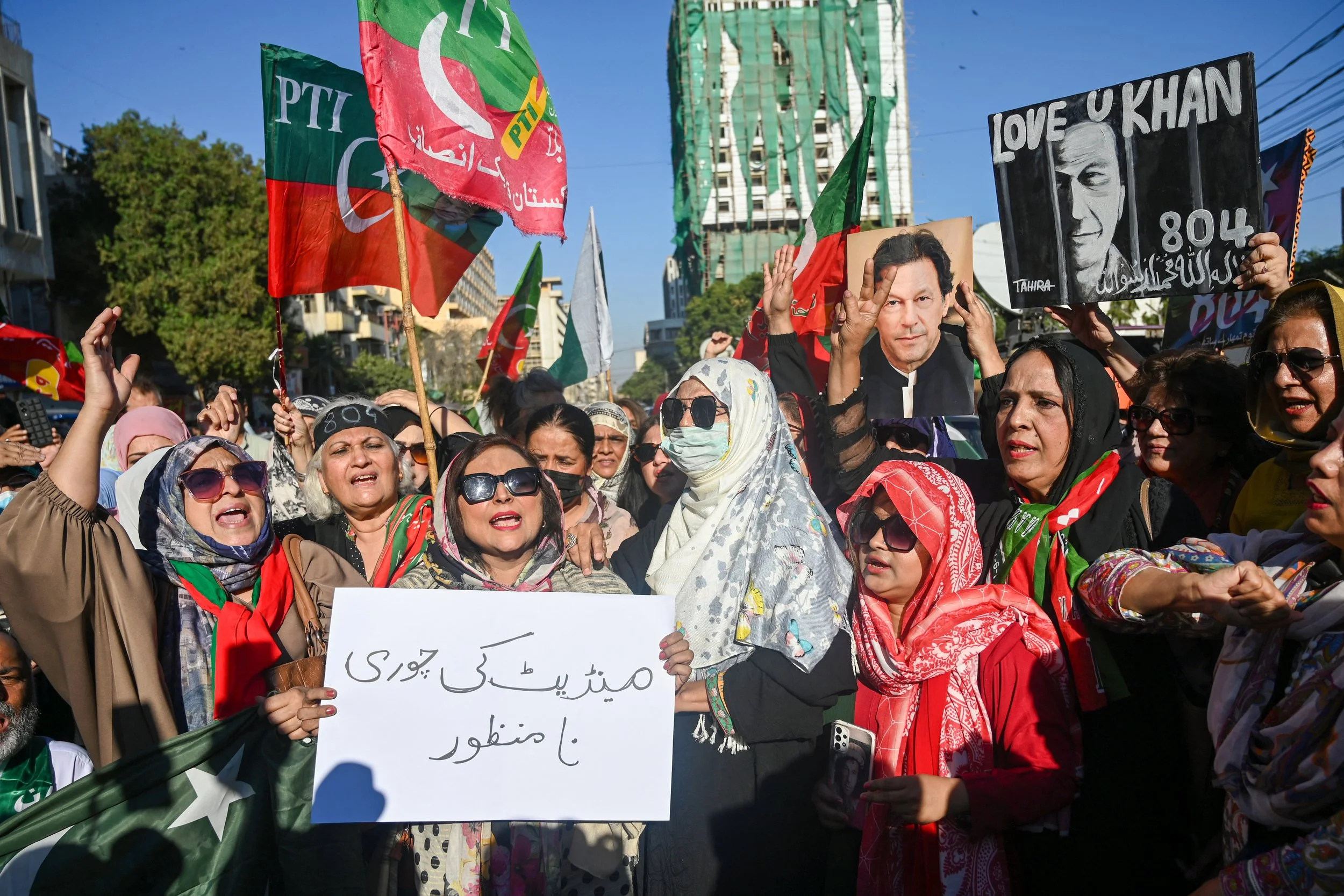Rigged National Election
The Targeting of Political Party Pakistan Tehreek-e-Insaf (PTI)
The February 2024 general elections in Pakistan were marred by widespread allegations and accounts of manipulation and suppression, targeting the most popular political party Pakistan Tehreek-e-Insaf (PTI) led by former Prime Minister Imran Khan who remains in arbitrary detention since 5th August 2023. The electoral process faced significant criticism for actions that undermined democratic norms and fairness.
Supporters of the Pakistan Tehreek-e-Insaf (PTI) party protest against the alleged election rigging in Karachi
Image credit: Al-Jazeera
Disqualification and Symbol Removal
In January 2024, the Election Commission of Pakistan (ECP), with the Supreme Court's endorsement, barred PTI from using its iconic cricket bat symbol, citing irregularities in intra-party elections. This decision appeared disproportionate and politically motivated, forcing PTI candidates to run as independents with disparate symbols, severely impacting voter recognition, especially in a country with a literacy rate of only 60%.
Harassment and Intimidation of Candidates
PTI candidates and supporters faced widespread harassment from the police and opposition supported by individuals of the military establishment. They were not permitted to campaign, had their nomination papers rejected, and were subjected to arbitrary arrests and intimidation. Some candidates were even abducted, tortured and even coerced into leaving the party.
On election day, there were significant disruptions, including internet shutdowns and delayed result announcements. Initial counts showed PTI-backed independents leading in numerous constituencies, but final results were delayed and allegedly manipulated, leading to widely supported accusations of vote tampering.
108 Members of Jailed ex-Prime Minister Imran Khan's Party Sentenced to up to 10 Years in Prison
On 31st July 2025, in further attempts to paralyse Imran's Khan's party, 108 members of Imran Khan's party (including Member of National Assembly and leaders of the opposition) were sentenced to up to 10 years in prison without credible evidence, for their alleged roles in the May 9th 2023 protest and riots.
Election Day Irregularities
Following Pakistan's general elections in February 2024, the United States, United Kingdom, and European Union expressed significant concerns regarding the electoral process and called for thorough investigations into reported irregularities.
The U.S. State Department highlighted "undue restrictions" on freedoms of expression and assembly, noting incidents of violence and attacks on media personnel. They emphasised the necessity for a full investigation into claims of electoral interference or fraud.
The European Union pointed out a "lack of a level playing field," attributing this to the inability of certain political actors to participate in the elections, along with restrictions on freedom of assembly, expression, and internet access.
Similarly, the UK Foreign Secretary, David Cameron, acknowledged "serious concerns" about the fairness and inclusivity of the elections, citing issues such as internet restrictions on polling day, delays in result reporting, and allegations of irregularities in the counting process.
These international responses underscore the widespread apprehension about the integrity of Pakistan's 2024 electoral process and the importance of addressing these concerns to uphold democracy.
International Condemnation
Commonwealth Pakistan National Election Report 2025 Reportedly Withheld
Multiple news outlets including the Telegraph have reported on a leaked Commonwealth report which investigative journalists from Dropsite News claim was purposely withheld to cover up widespread election rigging by the military to steal the election from Imran Khan.
Click here for the leaked Commonwealth Report on the Pakistan Election February 8th 2024.
The leaked Commonwealth report on the Pakistan Election of 8th February 2024 clearly indicates large scale rigging against Imran Khan's party Pakistan Tehreek-e-Insaf (PTI) who were forced to contest as independent candidates. Click above for the full report.

